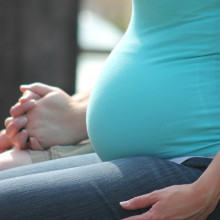The physiology of pregnancy
What happens to the body when getting ready to bring a whole new person into the world? Lara Morley wrote us this answer...
In this episode

- Naked Body: The physiology of pregnancy
Naked Body: The physiology of pregnancy
Lara Morley, University of Leeds
What happens to the body when getting ready to bring a whole new person into the world? Lara Morley wrote us this answer...
Morning sickness, stretch marks, going to the loo all the time – we’ve all heard about the side-effects of being pregnant. But why do these necessary - but often undesirable – changes happen when there’s a bun in the oven?
Well, it all starts very early in pregnancy and it’s about getting mum ready for the demands that the growing baby will make for oxygen and nutrients. Some of the changes help protect mum during birth, and some are a by-product of the rollercoaster ride that her hormones go through….
…Hormones like human chorionic gonadotrophin. Produced by the cells of the embryo in the earliest days of pregnancy, hCG is the hormone detected when you pee on a stick to find out if you’re pregnant. It’s also probably what accounts for ‘morning sickness’ – although anyone who’s been pregnant will tell you that name is misleading as it can hit you at any time, day or night.
Other hormones including oestrogen, progesterone and relaxin are manufactured by cells in the placenta. These hormones cause blood vessels throughout the body to dilate, making sure blood flows to the baby, but also causing mum’s blood pressure to drop. And that’s why many women get dizzy or even faint, feel flushed, and even why they might get a bunged up nose!
Progesterone keeps the uterus relaxed, preventing contractions until labour. This also has a profound effect on the muscle layer lining the gut, making heartburn, indigestion and constipation very common.
Then there’s the stretchy skin. After all, the growing bump has to have somewhere to go! This is because oestrogen and relaxin enable collagen fibres to be pulled apart. Stretch marks are the result of this process happening quickly. Relaxin also affects the connective tissue between joints, in particular at the front of the pelvis. Coupled with the weight of the baby, it’s hardly surprising that many expectant mums experience pelvic pain.
As if all that’s not enough, in late pregnancy, the size of the uterus means the lungs have less room to breathe! But the diaphragm and chest muscles adapt to compensate and so women take deeper breaths during pregnancy. This increases ventilation by 40%, without changing how many breaths are taken. As a result there are higher levels of oxygen in the blood, which promotes the transfer of oxygen to the baby. But it also means that the majority of pregnant women feel breathless.
So there you have it. Pregnancy is unique. At no other time in life does a woman’s body undergo such profound changes in physiology. These changes occur almost immediately after conception and affect almost every aspect of bodily function.
Related Content
- Previous Our PS5 arrives!
- Next What happened to the Wankel Rotary Engine?





Comments
Add a comment